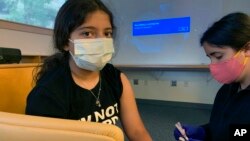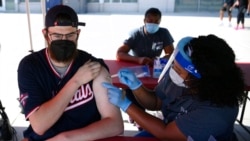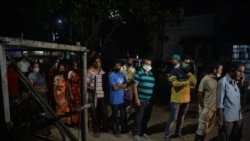The Pfizer and BioNTech drug companies said Monday that lower-dose shots of their two-dose COVID-19 vaccine are safe and effective for 5- to 11-year-old children.
The U.S. company and its German partner BioNTech said trials showed the vaccine was well tolerated and robust, neutralizing antibody responses at the lower dose levels necessary in younger children.
Pfizer said it planned soon to seek authorization to use the vaccine in younger patients in the U.S., Britain and the European Union, a move that could greatly expand the scope of the vaccination effort. About 28 million U.S. children fall into the age range, and millions of adults have still declined to get the jab.
The U.S. Centers for Disease Control and Prevention says that more than 181 million people have been fully vaccinated in the country, but that 70 million others age 12 and older have not been inoculated.
Pfizer said it studied a lower dose — one-third the strength of the adult dose — in tests involving more than 2,200 kindergartners and elementary school students. Two-thirds of the children were given the vaccine, and the remaining third were given saltwater shots. The company said the vaccinated children developed antibody levels that were just as strong as those exhibited by teenagers and young adults.
With students now back in school and the delta variant spreading throughout the United States, many parents have been anxious for government health officials to approve the vaccine for their young children.
Compared with older people, children are at lower risk of severe illness or death from COVID-19, the disease caused by the coronavirus, but more than 5 million children in the U.S. have tested positive for COVID-19, and at least 460 have died, according to the American Academy of Pediatrics.
U.S. vaccine maker Moderna is also studying its shots in young children. Both Pfizer and Moderna are studying using the vaccine in infants as young as 6 months, with results expected later this year.
On Monday, deaths in the United States from COVID-19 reached 675,975, surpassing deaths from the 1918 Spanish flu. While the novel coronavirus is now the deadlier pathogen in the United States, the Spanish flu still killed a larger proportion of the country because the U.S. population a century ago was only one-third of what it is today.
Around the globe
Elsewhere in the world, India's health minister said Monday the country would resume vaccine exports in October. India, the world's biggest maker of vaccines, had stopped shipments for the past five months as it battled its own deadly wave of infections.
Health Minister Mansukh Mandaviya said the country's monthly vaccine output is set to top 300 million doses next month. He added that only excess supplies would be exported.
Meanwhile, some private hospitals in Kolkata, India, bracing for a possible surge in pediatric COVID-19 cases, have enhanced their facilities and provided additional training for health care professionals.
In Britain, the COVID-19 vaccination campaign for children ages 12-15 began Monday at schools around the country.
A Greece health advisory body recommended Monday that COVID-19 vaccine booster shots be given to people older than 60, care home residents and health employees. The country has already begun offering booster shots to people who are immunocompromised.
CDC study
A new study published by the CDC revealed that roughly one-third of people who tested positive for COVID-19 still reported symptoms several weeks after the fact.
The CDC reported that rates were even higher in women, Black people, people older than 40, and those with preexisting conditions. The CDC describes people with "long COVID" as experiencing symptoms more than one month after a positive test result.
The U.S. has more COVID-19 cases than any other country, according to the Johns Hopkins Coronavirus Resource Center, with more than 42 million infections. Around the world, there have been nearly 229 million cases and 4.7 million deaths, according to data.
Singapore reported more than 1,000 new cases Sunday, its highest number since April 2020. Even with 80% of its population fully vaccinated against the coronavirus, Singapore has paused further reopening.
Some information for this report came from The Associated Press and Reuters.







